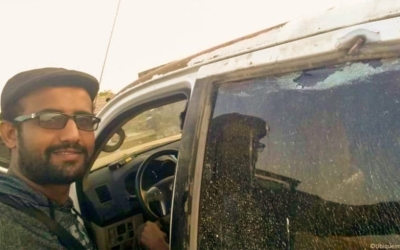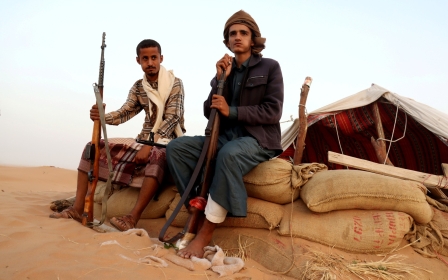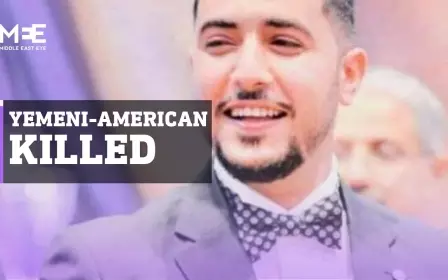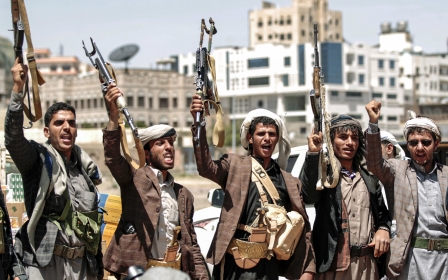Yemen: Northerners opt for Seiyun airport fearing STC violence on road to Aden
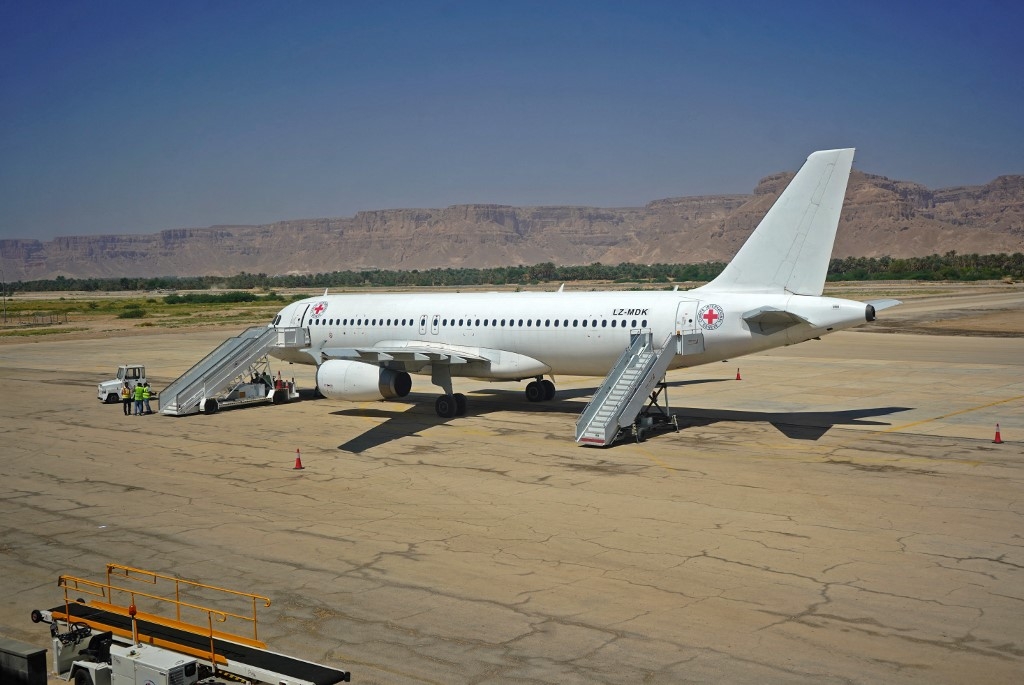
The recent killing of an expat on his way to the north of Yemen has exacerbated fears of the risky journey to Aden airport in the south, leaving many with no choice but to seek a longer route to the eastern airport of Seiyun.
Yemenis making trips from northern areas to the airport in Aden and back have for years faced threats and obstacles on the road, which is riddled with checkpoints run by armed southern separatists.
Many had thought the journey was worth the risk due to the relatively short distance. However, reports of the rising threat facing them in the south have pushed many to choose to take the much longer journey to Seiyun airport, which is under the control of the government and in the eastern province of Hadhramaut.
Yasser Abdul-Monem, a 41-year-old man from Sanaa, travels to India every six months to receive treatment for his liver cancer. Despite his illness, he said he could not escape harassment at checkpoints run by the separatist Southern Transitional Council (STC).
“Although the trip to Aden is long and hard, I was never worried about the road itself, but rather about the checkpoints, where they try to extort us in any way they can,” Abdul-Monem told Middle East Eye.
New MEE newsletter: Jerusalem Dispatch
Sign up to get the latest insights and analysis on Israel-Palestine, alongside Turkey Unpacked and other MEE newsletters
“One day they stopped the driver and me at a checkpoint in Lahj province and immediately accused me of being a Houthi member because I speak the Sanaani dialect.”
Abdul-Monem said he was taken to a room near the checkpoint and kept for around six hours, while he tried to convince the soldiers there that he was going to India in order to receive healthcare.
“I showed them my medicine and all other documents related to the treatment but they didn’t let me go. Finally one of them asked me for money and he allowed us to leave,” he added.
The Saudi-led coalition, which backs the internationally-recognised government of Abed Rabbu Mansour Hadi, has imposed restrictions on Yemen’s airspace since August 2016, resulting in the closure of the capital’s airport to commercial flights.
Northerners have since been forced to travel through Aden airport in the south or Seiyun airport in the east.
Yemenis residing in the north have always preferred making the journey to the southern port city as it is closer to them.
However, since Abdul-Malek Sanabani’s death on 8 September, there have been more reports of people being held at Emirati-backed STC military checkpoints for hours while on their way south.
Sanabani, who travelled to Yemen from the United States one day before his death, was suspected of being a member of the Houthi movement while he was on his way from Aden towards Houthi-controlled areas in the north.
Affiliation to the Houthi movement, which controls most of Yemen’s north, has been the most common accusation that northerners say they face at checkpoints belonging to the STC.
Recent media reports said that four Yemeni students were “abducted” at a checkpoint manned by STC forces on 4 September, after arriving from Malaysia via Aden International Airport.
Two of the students were released on Monday, while the two others and their driver remain in detention.
'Racism' on the road to Aden
Meanwhile, a number of northerners have been vocal on social media about the insults, racism, and threats they have endured at STC checkpoints.
Despite his ordeal, Abdul-Monem continued to travel through Aden because although the journey takes 15 hours from Sanaa, it takes more than 20 hours to reach Seiyun. That, however, changed when Sanabani was killed.
“I’m a sick person and can hardly afford the way to Aden, but after I heard the news about Sanabani, I will not travel again from Aden airport,” he said.
“From now I will travel from Seiyun airport and will split my journey from Sanaa to Seiyun over two days. It is a very long journey but it is safe.”
Abdul-Monem said he hoped to travel through Sanaa airport again, calling on the international community to intervene and reopen Yemen’s airspace.
On the journey from Sanaa to Seiyun, Yemenis only go through checkpoints operated by government soldiers who are widely considered welcoming to people travelling from across the country to the eastern city.
Harassment at the hands of STC forces at checkpoints in the south is not new.
'Houthi spies are spread out in the south and the targeting of southern areas by the Houthis is evidence that their spies provide them with the information'
- Adnan Yafie, STC supporter
Mohammed Mustafa owns a business in the capital and regularly travels abroad for work.
He started making the long trip to Seiyun airport three years ago after enduring a rough interrogation session by UAE-backed forces at the entrance to Aden.
“Hadhramaut is a very different province and its people have good hearts so I like to travel from there,” Mustafa said.
“There are checkpoints from Seiyun to Sanaa, but the soldiers do their job without insulting anyone. We also don’t feel racism here the way we feel it on the road to Aden.”
Mustafa said he advises all northern travellers to fly from Seiyun if they can afford to, adding that he only goes through Aden when he cannot find a flight to or from Seiyun airport.
Targeting 'Houthi spies'
STC forces and their supporters in Aden, who call for the independence of southern Yemen, believe there are Houthi spies in the south, which has led to the arrests and investigations of northerners in Aden who they suspect of belonging to the movement.
“Houthi spies are spread out in the south and the targeting of southern areas by the Houthis is evidence that their spies provide them with the information,” Adnan Yafie, an STC supporter, told MEE.
Yafie said that while he supports the STC, he was not happy about the death of Sanabani and the abduction of people who have been detained without trial.
“The investigation that our forces do at the entrances of the south is good, but we need to see a fair trial for Sanabani’s death, and people who have been accused [of being Houthis] should also have trials,” he added.
Yafie said that he is against killing civilians anywhere, as they themselves in the south have suffered from deadly attacks on their people during the civil war of 1994.
Yafie said that people from the north can come to Aden normally but they need to be subject to investigation at checkpoints, adding that this is a standard procedure for forces that want to protect their country.
Meanwhile, Mahmoud Mubarak, from Aden, said he welcomes northerners coming to the port city and would treat them as if they are originally from Aden.
“Bad people can be from the south and north and we shouldn’t deal with people based on their area but rather based on their morals and behaviours,” he told MEE.
'There are many southerners who work in the north nowadays and vice versa, so it isn’t right to accuse any northerner of being a Houthi'
- Mahmoud Mubarak, Yemeni from Aden
“I travel to Sanaa and live there normally as if I’m from Sanaa, so northern people should feel the same in the south.”
Mubarak is sympathetic to the call for an independent south, but he believes that this is a political issue and southerners should not be attacking northerners.
“Independence is a political matter that regular people of the north have nothing to do with. There are many southerners who work in the north nowadays and vice versa, so it isn’t right to accuse any northerner of being a Houthi.”
Mubarak added that the accusation of being a “suspected Houthi” is a general accusation used against anyone from the north.
“We don’t want to tarnish the reputation of the south by this general accusation. We should welcome northern people and reflect to the world that we are civilised people who accept others,” he said.
Middle East Eye delivers independent and unrivalled coverage and analysis of the Middle East, North Africa and beyond. To learn more about republishing this content and the associated fees, please fill out this form. More about MEE can be found here.



